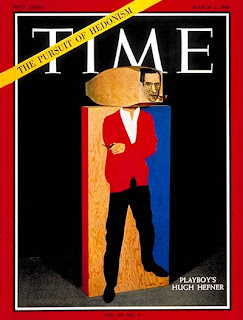
 Oh yes, there's one other thing they have in common: They both appeared on the cover of Time Magazine!
Oh yes, there's one other thing they have in common: They both appeared on the cover of Time Magazine!(Assumption 2007: This homily was given on
[For the audio version of this homily, click here: Assumption 2007]
Here’s a question you’ve probably never considered before:
What do Hugh Hefner and Jack Kevorkian have in common? (Hefner, of course, is the founder of Playboy Magazine; Kevorkian, also known as “Dr. Death,” remains the poster boy for physician-assisted suicide.) They’ve probably never been mentioned by name in the same sentence—until now.
What do they have in common—aside from the fact that at this point they’re both pretty old?!!!
The answer is: They both believe that the human body is not very important!
Now that may surprise you, especially regarding Hefner. Here, after all, is a man who is constantly surrounded by fit, beautiful bodies; he’s a man who has made a fortune off those same bodies. . . .
“Fr. Ray, how could you say that he doesn’t think the human body is very important?”
Because at the deepest level of his being, he doesn’t! And his magazine and pornography empire merely serve to illustrate the point.
Jack Kevorkian says, “A person can legitimately kill his body whenever that body doesn’t function in the way he wants it to.” Hefner says, “The human body can be used as a toy, or as an object, or as a tool to manipulate others; it really doesn’t matter.”
In both cases, the message is that the body isn’t all that valuable! We can do with it whatever we feel like doing with it.
To which Mary, our Blessed Mother, says, “No!”
Mary says to us—especially on this particular feast day—“The human body has been redeemed by my Son. He took on a human body in my womb, died in his human body on the cross, rose in his human body on Easter Sunday, and ascended to heaven with his human body on Ascension Thursday. He did all that in order to save not only our souls from eternal death but our bodies as well. You see, our bodies are made not only for earth; they’re also made for heaven! That means they matter a lot! My Assumption illustrates the point. At the end of my life, my Son did not allow my body to decay in any tomb; rather he took me up to heaven immediately, soul AND body. When you die, unfortunately, your soul is separated from your body—but only for a time. At the end of the world, your body will be raised from the dead and will be reunited with your soul. If you ended your earthly life in the state of grace, you will then join me—soul AND body—in my Son’s kingdom. This is why the preface of the Mass of the Assumption calls my Assumption your ‘hope.’ As I am now, you hopefully will someday be.”
When you stop and think about it, my brothers and sisters, the Ten Commandments, the Golden Rule, the corporal works of mercy, the Church’s pro-life teachings--and even the Church’s norms on how to treat the bodies of the dead--are all tied to this simple truth that our bodies have value; that our bodies have been redeemed by the sacrifice of Jesus Christ, and are destined to become like Jesus’ glorified body—and like Mary’s.
We live in a culture right now where many people either don’t know this truth, or have forgotten about it. And because of that, countless numbers of men and women go to extremes these days: either they care for their bodies too much—as if their earthly bodies will exist forever in their present condition; or they treat their bodies and the bodies of others as disposable objects (a la Jack Kevorkian); or they treat them as tools to manipulate other human beings (a la Hugh Hefner).
And a few actually do all 3 of those things!
Mary’s Assumption teaches us the proper attitude toward the body. Mary’s Assumption teaches us that we should give our bodies (and the bodies of other people) respect and reasonable care.
Respect and reasonable care.
Holy Mary, Mother of God, pray for us, that we will all take this lesson to heart, and allow it to influence how we treat ourselves—and others—in the future.
And we offer that very same prayer today for Mr. Hugh Hefner and Dr. Jack Kevorkian, and for the many, many people in the world right now who think—and who act—just like they do.